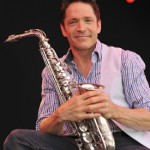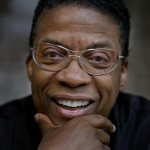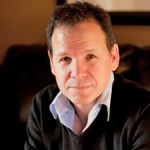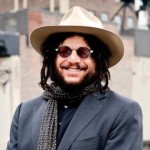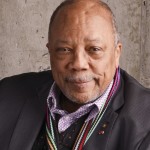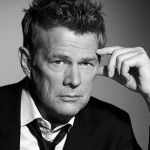How the Grammy-nominated bassist—you heard him recently on Daft Punk’s “Get Lucky”—carefully manages his most precious resource: time. By David Zax.
Even if you haven’t heard of Nathan East, you’ve certainly heard him. This veteran bassist has toured with or accompanied just about everyone: Michael Jackson, Eric Clapton, Phil Collins, George Harrison . . . the list goes on. Most recently, you’ve heard his work on Daft Punk’s “Random Access Memories,” including the ubiquitous hit “Get Lucky.” A Hulu documentary on his life, “For the Record,” has just debuted, and after decades as a supporting musician, 2014 saw East put out his first solo album, which was recently nominated for a Grammy.
On top of being one of the most prolific bassists in history—playing on over 2,000 albums—East has found time to become a certified magician, a licensed pilot, and to raise teenaged twins with his wife. How does Nathan East get it all done? Fast Company caught up with this modern renaissance man to learn a few tips and tricks.
MEDITATE
East starts each day with 20 minutes of early-morning mediation, when others are asleep and the only sounds are of birds chirping. East picked up meditation in the late ’80s. “George introduced me to it,” he says casually (George Harrison, that is). East went to a few places in Oxford, England, to pick up the basics. “It was just great to, no matter how much was going on, be able to shut everything down. It created more room in your brain to be able to handle this crazy schedule.”
DO IT ALL—AT ONCE
And East knows a thing or two about crazy schedules. “Since I was a kid, I was always a lover of life, just fascinated by all the options available,” says East. It’s one reason why he got a pilot’s license by the time he was 25. Years ago, he used to fly several times a week; he’d fly to San Diego to visit his folks, or “to Santa Barbara for lunch.” The fact that he’d have a gig in the evening wouldn’t prevent him from having a densely packed day beforehand, at all sorts of altitudes. “Some days I’d wake up at 6:30, hit the airport at 7, fly to Mammoth Lakes to ski, be on the slopes at 9, ski till 4 or 5, fly home, and do a gig.”
KEEP A GRATITUDE JOURNAL
Gratitude journaling came naturally to East—since his life has always been, essentially, awesome. “In 1980, I’d find myself in a studio with all my heroes, so I’d go home and write, ‘I just did a session with Ray Parker!’” Eventually, this became a habit of writing three things he was grateful for every day. “You’ll never run out,” he says. He’s thankful for the safety of his kids (14-year-old twins), for his health, for his career, for having been born in this time and this country, and for the great workout he had yesterday.
SLEEP OPTIONAL
“I don’t like to broadcast it too much,” he says, since he knows others aren’t blessed with this natural ability. But for as long as he can remember, East has naturally awoken fully rested after about four hours of sleep. He says his brother, a priest in Washington, D.C., is the same way. “Whatever the gene is that we got, we can function without having much sleep.” Still, even if you’re one of those normal people who needs 6 or 7 or 8 hours of sleep, East recommends reading books on time management. A recent favorite: Greg McKeown’s Essentialism.
SURROUND YOURSELF WITH HARD WORKERS
East was impressed with how meticulous Guy-Manuel de Homem-Christo and Thomas Bangalter of Daft Punk were. “When you work with high-achievers, you see where their bar is,” he says—and you’re inspired to set your own bar high. He remembers the first time he was impressed with a musician’s work ethic. “Barry White worked every single day; he showed up at 10 a.m. and stayed till 6 in the evening. That was one of the first times I realized, ‘Oh yeah, you have to go in there and approach this like a job.’” Later Phil Collins became East’s “work ethic guru.” East says “he’s the first guy to show up, the last guy to leave.” Collins will even put a full-throated effort into low-stakes tasks: “He’ll sing as though he’s singing a concert, even though it’s just a sound check.
FOLLOW YOUR INTERESTS
In the ’80s, East was on tour with an impressive magician. Most people would simply say, “Ah well, I’m a musician… perhaps in another life.” But East decided he had to get good at magic. “I never got the memo that you can’t be everything, can’t do everything,” he says. “I just want to get as much life as possible while here.” East studied up, eventually joining elite magic groups in England and Los Angeles. “Magicians jam like musicians,” he says. “They get together at a house, pull up a hat, and start trading their repertoires of illusions.” East sometimes will pull a trick as an icebreaker at a group dinner or while teaching a master class. “I’m always wondering what the next thing is, what the next interest will be. I kind of welcome everything,” he says.
DON’T PANIC OVER THE TICKING CLOCK
East is 59; a few colleagues and friends his age have passed away this year. “The clock always seems to be ticking, and I race against it every day.” But the fact that his time on Earth is finite only makes East savor life more. He keeps saying “yes” to things—sometimes too many things, he admits. But it’s hard to say no, when there are so many things he enjoys. “Love what you do, and do what you love,” says East. “I put fun at the top of my list, so by the time I’m ready to leave, no one’s going to be able to say, ‘Well, he didn’t have fun.’”
[Photos: courtesy of Nathan East]
Read full article here: http://www.fastcompany.com/3040885/how-i-get-it-done/7-classic-tips-on-creating-a-career-you-love-from-modern-renaissance-man-n

